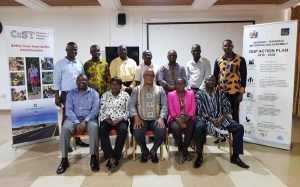CoST Technical Advisers, regional managers and members of the Sekondi-Takoradi Metropolitan Area (STMA) CoST team have wrapped up a series of high-level events in Ghana this week. Since STMA joined CoST, there has been a focus on how to align the rest of the country with the CoST approach. CoST representatives have been supporting members of the Ghanaian engineering community, government, private sector and civil society at events recently with the aim of enhancing the quality and transparency of infrastructure projects.
Engineering a better future
In Accra, CoST Technical Adviser Hamish Goldie-Scot attended the launch of the Ghana Low Volume Roads Manual (LVR Manual). Launched by the Ghana Institute of Engineering, the manual is designed to provide guidance for engineers, contractors, academia and consultants around the design of roads which are accessed by less than 300 vehicles per day, usually connecting people to homes, schools and neighbouring villages. The high-profile launch was attended by around 90 people, including those from Municipal Assemblies, District Assemblies and academia.
The LVR manual makes specific reference to applying the CoST approach for good governance and transparency. However as outlined by multiple speakers, including Mr Anthony Karbo, Deputy Minister of Roads and Highways, the manual must first and foremost be used if it is to be effective in building capacity. Beyond this, broader issues in governance, transparency and accountability must also be addressed to ensure infrastructure projects increase in quality and efficiency. This is where the CoST approach could have a truly beneficial impact in infrastructure development in Ghana, laying the groundwork to bolster the reforms in governance needed for long-term change.
Reforming data disclosure
 CoST also held a joint workshop in Accra with the Public Procurement Authority and the Ghana Anti-Corruption Coalition (GACC). This workshop focused on the benefits of increased transparency and accountability in public infrastructure and was attended by a range of representatives from across government, including the transport, public works, housing and finance departments. The diversity of government representatives in attendance highlights the cross-departmental nature of infrastructure, and the shared interest of ensuring it becomes efficient and high-quality.
CoST also held a joint workshop in Accra with the Public Procurement Authority and the Ghana Anti-Corruption Coalition (GACC). This workshop focused on the benefits of increased transparency and accountability in public infrastructure and was attended by a range of representatives from across government, including the transport, public works, housing and finance departments. The diversity of government representatives in attendance highlights the cross-departmental nature of infrastructure, and the shared interest of ensuring it becomes efficient and high-quality.
One of the key issues discussed at the workshop was Ghana’s Procurement Portal. While the portal requires information from the procurement stage of the project cycle be disclosed, it ignores other critical stages such as planning and implementation. By adopting the Open Contracting for Infrastructure Data Standard (OC4IDS), a new standard developed by CoST and the Open Contracting Partnership, Ghana could rectify this, and would have the necessary tools to disclose data from across the entire project cycle.
Speaking at the roundtable, Mrs Beauty Emefa Narteh who is Executive Secretary of the GACC, said that transparency, integrity and value for money were fundamental to any discussion about anti-corruption.
‘’That is why we have always been pushing for CoST to be in Ghana, not because it is a panacea to the solution of anti-corruption, but because we believe in can make some additional impact on the works that we are doing’’.
Just as STMA’s CoST membership aligns with its OGP Action Plan, Ghana’s National Action Plan relates specifically to CoST’s work in public infrastructure. Commitments in this Action Plan concern transparency and accountability, as well as open contracting, beneficial ownership and disclosure. As such, it seems an apt time to build on STMA’s CoST membership and unify efforts across the country to create a more efficient and transparent infrastructure sector.
